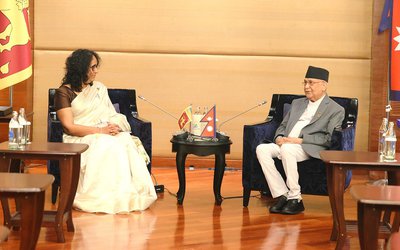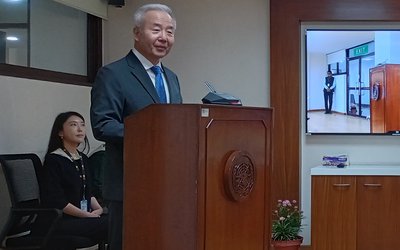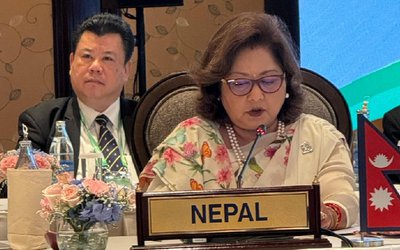
Barsha Tharu, a student of Gautam Buddha High School of Kapilvastu district, usually avoided school for four days a month until a year ago. Due to her monthly period, Barsha found it difficult to attend classes.
"Due to our social and cultural restrictions and unavailability of toilets, I used to remain absent for four days a month from my school," said Chaudhary. “After a campaign of local NGO and construction of separate toilet for girls, most of the girl students, including me, now go to school," said Chaudhary.
Mina Koirala, 60, a resident of Banshighat Slum, has seen a lot of transformation in her life. When she was young, with menstrual periods, girls were usually isolated from the rest of the family and put in unhygienic places. "I faced many trauma of living separately. Although menstrual cycle is a biological process, we were treated as bad as animal during the period." The situation has changed now as everyone understands this in urban areas.
Organized by WaterAid Nepal, the function saw people from different walks of life taking part and breaking the silence on menstrual hygiene: hearing unheard voices. Nepal's renowned artist Karishma Manandhar also shared her experience of first menstruation. "My family put me in isolation for two weeks," Manandhar said. "Because of my own bitter experience, I gave freedom to my daughter."
"Menstruation is a natural, biological process in female body, not a sin from past birth. So, holy bath and worship are not required. If you don’t want to fast or take holy bath or do worship that’s your choice. Thank you, everyone, who came to support us," writes Ashutosh Tiwari, Country representative of WaterAid Nepal in his face book wall.
"We broke the silence on menstrual hygiene today together with our NGO partners hearing unheard voices and calling to translate commitments to actions. Many thanks to our supporters including renowned Nepali cine actress Karishma KC Manandhar, singer, government officials representing and responsible addressing issues on menstrual hygiene, civil society organizations working for sanitation and drinking water, development partners, media and student from community school"
The WaterAid and partners' program at Trade Tower Thapathali saw Karishma Manandhar, Amrita Gyawali, Pema Lhaki, Rose George, Anita Pradhan, Govind Shrestha, Rajendra Aryal, and so many more colleagues, friends and well-wishers, he noted.
"Menstruation is natural process, not a sin! Women in Nepali society are taught what not to do from religious and cultural aspects rather than how to maintain hygiene during the menstrual period," said Sarala Khadka, 45, from far west Nepal.
Dilli Ram Sharma, Director of Department of Education, stressed the need to make toilets in the schools. “The government is planning to construct 2,000 toilets in the school," said Sharma.
Under secretary of Ministry of Federal Affairs and Local Development Ramesh Adhikary said his ministry is ready to allocate budget for school sanitation. "There is the need to make the toilets friendly for girls and women," said Ram Chandra Sha, under secretary of Department of Drinking Water and Sewerage.
"The government is giving high priority to sanitation sector. Sanitation is one of the major components of health," said Dr. Tirtha Raj Burlakoti, joint secretary at the Ministry of Health and Population.
At a time when overwhelming rural Nepal regards menstruation period as a sin, this kind of program helps to change the scenario. Organized by WaterAid with coordination with nine local NGOs working in sanitation sector, the program was the first of its kind to break silence on menstrual hygiene.
- IME GROUP: Expands Into Paper Industry
- Mar 24, 2025
- CPN UML: Instigated By India
- Mar 23, 2025
- ADB’S CHIEF ECONOMIST: Nepal Reduces Poverty
- Mar 11, 2025
- FM DR. DEUBA: A Successful Visit
- Mar 11, 2025
- MD GHISING: Target Of Personal Grudge
- Mar 09, 2025















